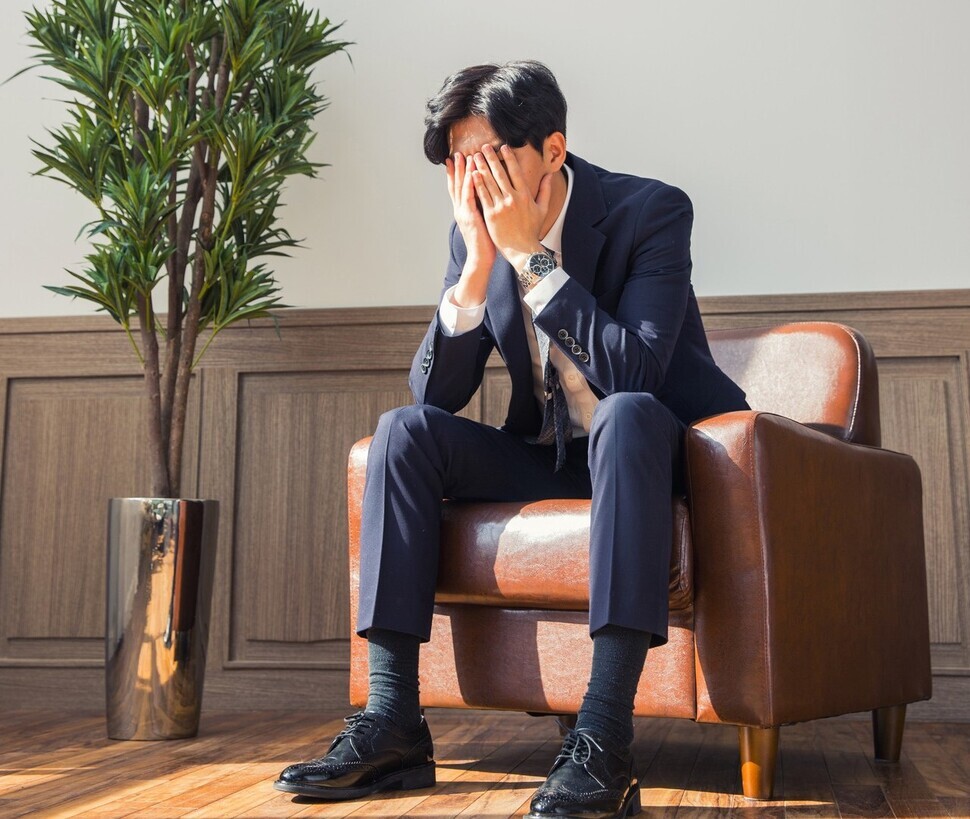hankyoreh
Links to other country sites 다른 나라 사이트 링크
Stress compounded by pandemic has more young S. Koreans reporting panic attacks

Luemoon (pseudonym), the 20-something owner of the Instagram account “Blue Moon Sketch Diary,” describes experiencing more intense symptoms of panic disorder due to stress from job-seeking while being unable to meet up with companions due to the COVID-19 pandemic.
“Finding a job, marriage, romance, getting a house — all the different pressures on people in their 20s are making the future seem more uncertain and making it difficult to get through each day,” they said.
More and more South Koreans in their teens and 20s are complaining of panic disorder symptoms due to the stresses of school and job-seeking compounded by the pandemic.
According to Health Insurance Review and Assessment Service statistics published Monday on “conditions of interest” among South Koreans, the number of teenagers diagnosed with panic disorder rose by 17.9% from 4,363 in 2019 to 5,143 in 2020, while the number for those in their 20s rose by 16.5% from 25,067 to 29,200 over the same period. The rates were both more than double the roughly 7.5% average increase across all age groups.
Analysts have attributed the rise in panic disorder diagnoses among South Koreans in their teens and 20s to the increased entrance exam and employment pressures amid the pandemic, combined with a lack of available means for alleviating stress.
Ahn Tae-woo, 23, said he has struggled with panic attacks since high school.
“I get severe bouts of panic when I’m under stress, and that’s gotten worse due to the pandemic, since the option of meeting other people has basically been ruled out,” he explained.
Luemoon said, “I’d always been prone to anxiety since I was a child, but the various pressures you face in your 20s — including the stresses related to job-seeking — have been triggers for panic.”
Paik Jong-woo, a professor of psychiatry at Kyung Hee University Hospital, said, “When I listen to the people in their teens and 20s who come to me with symptoms of panic disorder, most of them talk about the anxiety they feel about employment and the future, and also about how frustrating it is not to have any avenues for releasing stress due to the pandemic.”
“It’s been a global trend that social distancing due to COVID-19 has had a more severe psychological impact on younger people than on other age groups,” he noted.
Lim Myung-ho, a professor of psychology at Dankook University said that young people “are working hard, but are not optimistic that the future will be better, and that stress is leading to panic.”
Experts stressed the importance of making counseling centers readily available to teens and 20-somethings so that they can easily identify and treat panic disorder symptoms.
“More than just support for young people in terms of social services, we also need medical support, including a system of greater counseling center availability in high schools and universities so that young people can get therapy whenever they need it,” Lim said.
Paik said, “Since there’s a very high rate of full recovery from panic disorder when it’s treated early, it’s crucial for people to visit an expert and get diagnosed quickly, rather than struggling with it alone.”
Choi Soo-hee, a professor of psychiatry at Seoul National University Hospital, noted, “Sharing their symptoms and feelings on social media may help patients with regulating their feelings of panic, by allowing them to get their emotions and thoughts in order.”
By Ko Byung-chan, staff reporter
Please direct questions or comments to [english@hani.co.kr]

Editorial・opinion
![[Editorial] Intensifying US-China rivalry means Seoul must address uncertainty with Beijing sooner than later [Editorial] Intensifying US-China rivalry means Seoul must address uncertainty with Beijing sooner than later](https://flexible.img.hani.co.kr/flexible/normal/500/300/imgdb/original/2024/0517/8117159322045222.jpg) [Editorial] Intensifying US-China rivalry means Seoul must address uncertainty with Beijing sooner than later
[Editorial] Intensifying US-China rivalry means Seoul must address uncertainty with Beijing sooner than later![[Column] When ‘fairness’ means hate and violence [Column] When ‘fairness’ means hate and violence](https://flexible.img.hani.co.kr/flexible/normal/500/300/imgdb/original/2024/0516/7417158465908824.jpg) [Column] When ‘fairness’ means hate and violence
[Column] When ‘fairness’ means hate and violence- [Editorial] Yoon must stop abusing authority to shield himself from investigation
- [Column] US troop withdrawal from Korea could be the Acheson Line all over
- [Column] How to win back readers who’ve turned to YouTube for news
- [Column] Welcome to the president’s pity party
- [Editorial] Korea must respond firmly to Japan’s attempt to usurp Line
- [Editorial] Transfers of prosecutors investigating Korea’s first lady send chilling message
- [Column] Will Seoul’s ties with Moscow really recover on their own?
- [Column] Samsung’s ‘lost decade’ and Lee Jae-yong’s mismatched chopsticks
Most viewed articles
- 1[Editorial] Transfers of prosecutors investigating Korea’s first lady send chilling message
- 2[Exclusive] Unearthed memo suggests Gwangju Uprising missing may have been cremated
- 3‘Shot, stabbed, piled on a truck’: Mystery of missing dead at Gwangju Prison
- 4[Column] US troop withdrawal from Korea could be the Acheson Line all over
- 5S. Korea “monitoring developments” after report of secret Chinese police station in Seoul
- 6Could Korea’s Naver lose control of Line to Japan?
- 7US has always pulled troops from Korea unilaterally — is Yoon prepared for it to happen again?
- 8[Column] When ‘fairness’ means hate and violence
- 9[Editorial] Intensifying US-China rivalry means Seoul must address uncertainty with Beijing sooner t
- 10[Book review] Who said Asians can’t make some good trouble?